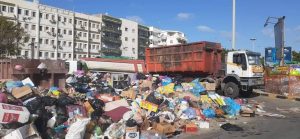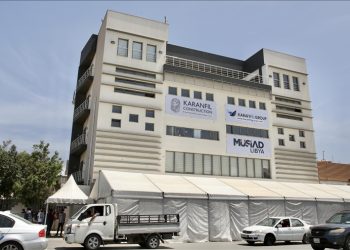By Sami Zaptia.

London, 7 November 2019:
Libya‘s Tripoli-based Local Government Ministry announced in a brief statement on Monday its intention to contract for a concession for the recycling of domestic waste in all of Libya’s municipalities.
It invited interested parties to present their proposals to its Environmental Sanitation Department in Tripoli. It gave no closing date nor did the statement give any further details.
In practice, this proposal will probably be just for municipalities under the effective control of the Tripoli government as the eastern government had made its own separate announcement on the matter in July.
It will be recalled that Tripoli’s Tajura and Sug Juma Municipalities had made separate announcements on the topic in October. Misrata Municipality had also made a similar announcement in September.
Tajura Municipality had announced that it was to build a waste recycling plant. It revealed that its garbage collection tip, located 26 km from central Tripoli, is the largest in the capital, receiving around 60 percent of the capital’s waste.
It estimated this at an average of 2,000 to 3,000 tons of mixed garbage per day of which 60 percent is domestic waste (which includes plastic, metal, glass, paper and organic waste) and 30 percent is building waste. It reported that its 600,000 sqm tip was already 90 percent full.
The municipality had said that the new recycling plant is expected to deal with 80 percent of the waste it receives which will contribute to a greener environment. The plant will also produce ‘‘clean’’ recycled end products, create new jobs and help transfer know-how into Libya.
The municipality did not publish the cost of the project and was unclear about how it would be financed. The central government has recently given municipalities new powers to raise local revenues.
In October, the Municipality of Sug Juma also invited companies to make offers for “Eco-friendly” garbage incinerators in accordance with the requirements of the Libyan General Environment Authority on Wednesday.
The Municipality had said that wishes to evaluate the option of garbage incineration as one of the common solutions used for the disposal of solid waste
In September, Misrata’s Chamber of Commerce and Industry had also invited companies to put forward offers to recycle the city’s rubbish.
However, it was eastern Libya that had led in on the matter with Abdalla Thinni, the “Prime Minister” of Libya’s eastern-based “Interim Government” meeting a representative of an unnamed German company in July this year to discuss ways of using garbage recycling in alternative energy production, Libya’s official state news agency LANA had reported.
The report had said that the meeting came on the back of the Interim Government’s success in eliminating the hygiene crisis in various areas of the east, including the municipality of Benghazi.
It reported that the recycling move comes as part of the Interm Government’s ongoing quest to find a radical and lasting solution to the hygiene issue.
The report said the German company was invited to submit proposals on a BOT basis for the project through the eastern Ministry of Local Government.
It will be recalled that Libyan cities, and particularly its most populous city, Tripoli, have been suffering a garbage crisis with municipalities failing to clear mounds of roadside garbage.
Libya’s National Meteorological Centre had warned of an impending environmental and health pollution cost of uncollected garbage in Greater Tripoli with the arrival of winter rain. It had warned that the potential resulting environmental and health pollution caused by rainfall may cost twice the cost of prevention and could leave a lasting impact.
The failure by authorities to collect roadside garbage has also led to the increasing ‘‘phenomenon of burning garbage’’ which Central Tripoli Municipality had said was ‘’unacceptable and unnecessary’’ and contrary to Libyan law.
In a further response to the crisis, the Municipality of Sug Il Juma agree in October to open up a large piece of land adjacent to Mitiga airport to be used as a temporary rubbish collection point (for three months) in an effort to remove rubbish off the streets ahead of the forecast rains. The move has been criticised for being too central, too near the airport and residential areas and that it may remain a tip forever.
Tripoli has always had issues with rubbish collection, with the authorities alternating over the years and decades between subcontracting collection to the private sector and between allowing the state Hygiene Company to carry out the collection.
However, lack of salary payment, absenteeism from work, over-employment and lack of investment have dogged the service for decades.
Since the Tripoli fighting has erupted, however, the authorities say that the main cause of the problem is that the capital’s main garbage dumping site at Sidi Sayeh is closed due to it being in the battle front in Tripoli’s war, and the various transition sites at Bu Sleem and Tajura are now either full or approaching saturation.
Equally, with the spread of arms and increased local power and NIMBY tendencies, no other Municipality seemed to want Tripoli’s main rubbish dump located in their neighbourhood. Tajura Municipality was the first to buck this trend.
https://www.libyaherald.com/2019/10/09/tajura-waste-recycling-project-launched/
https://www.libyaherald.com/2019/10/12/sug-juma-municipality-invites-offers-for-eco-friendly-waste-incinerators/
https://www.libyaherald.com/2019/10/07/libyas-meteorological-centre-forecasts-rain-and-warns-of-impending-environmental-and-health-pollution-cost-of-uncollected-garbage/
https://www.libyaherald.com/2019/07/17/eastern-libya-invites-bot-offer-from-german-company-to-recycle-waste-for-energy-production/
https://www.libyaherald.com/2015/05/19/foreign-company-to-be-contracted-for-city-cleaning-recycling-and-pest-control/








